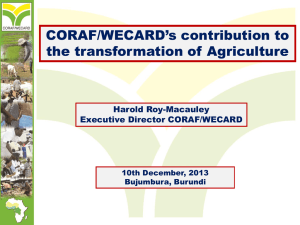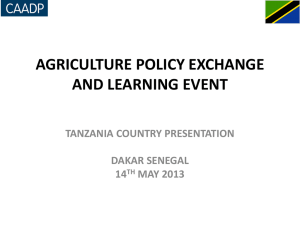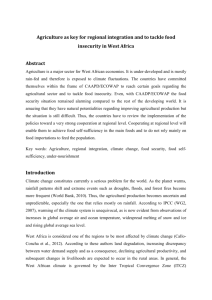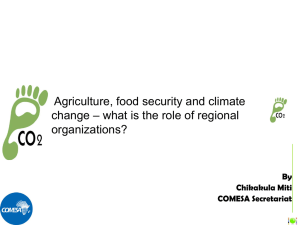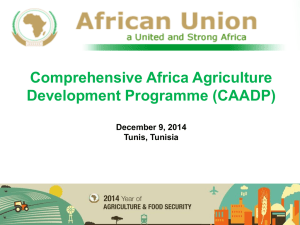Draft Concept Note - African Union Pages
advertisement
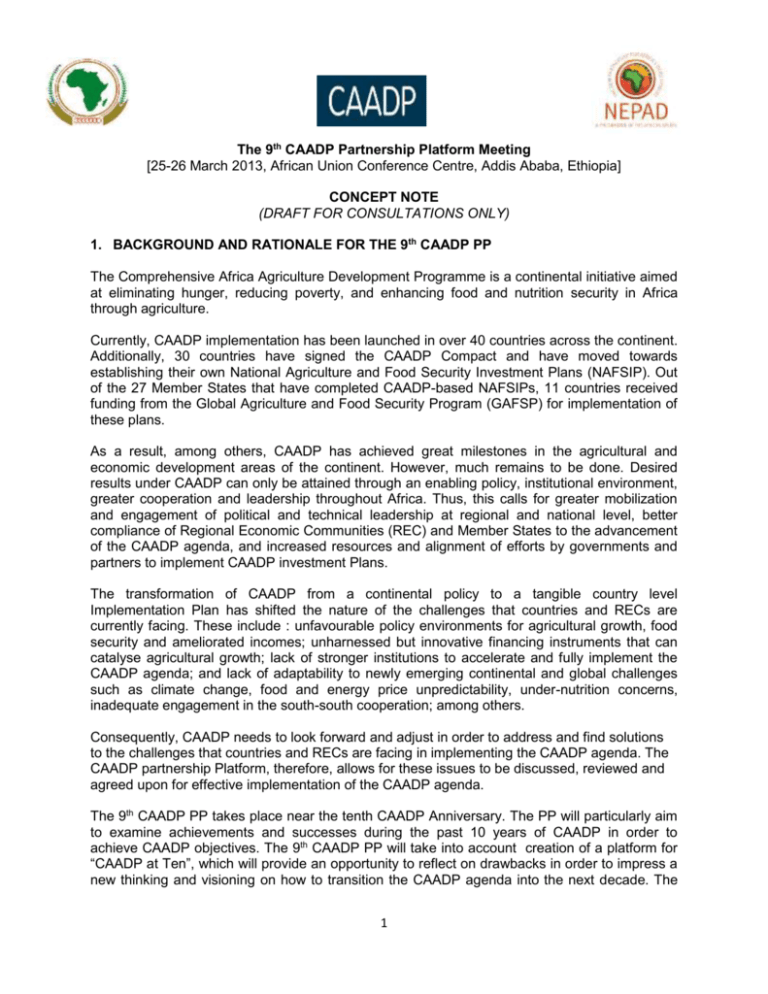
The 9th CAADP Partnership Platform Meeting [25-26 March 2013, African Union Conference Centre, Addis Ababa, Ethiopia] CONCEPT NOTE (DRAFT FOR CONSULTATIONS ONLY) 1. BACKGROUND AND RATIONALE FOR THE 9th CAADP PP The Comprehensive Africa Agriculture Development Programme is a continental initiative aimed at eliminating hunger, reducing poverty, and enhancing food and nutrition security in Africa through agriculture. Currently, CAADP implementation has been launched in over 40 countries across the continent. Additionally, 30 countries have signed the CAADP Compact and have moved towards establishing their own National Agriculture and Food Security Investment Plans (NAFSIP). Out of the 27 Member States that have completed CAADP-based NAFSIPs, 11 countries received funding from the Global Agriculture and Food Security Program (GAFSP) for implementation of these plans. As a result, among others, CAADP has achieved great milestones in the agricultural and economic development areas of the continent. However, much remains to be done. Desired results under CAADP can only be attained through an enabling policy, institutional environment, greater cooperation and leadership throughout Africa. Thus, this calls for greater mobilization and engagement of political and technical leadership at regional and national level, better compliance of Regional Economic Communities (REC) and Member States to the advancement of the CAADP agenda, and increased resources and alignment of efforts by governments and partners to implement CAADP investment Plans. The transformation of CAADP from a continental policy to a tangible country level Implementation Plan has shifted the nature of the challenges that countries and RECs are currently facing. These include : unfavourable policy environments for agricultural growth, food security and ameliorated incomes; unharnessed but innovative financing instruments that can catalyse agricultural growth; lack of stronger institutions to accelerate and fully implement the CAADP agenda; and lack of adaptability to newly emerging continental and global challenges such as climate change, food and energy price unpredictability, under-nutrition concerns, inadequate engagement in the south-south cooperation; among others. Consequently, CAADP needs to look forward and adjust in order to address and find solutions to the challenges that countries and RECs are facing in implementing the CAADP agenda. The CAADP partnership Platform, therefore, allows for these issues to be discussed, reviewed and agreed upon for effective implementation of the CAADP agenda. The 9th CAADP PP takes place near the tenth CAADP Anniversary. The PP will particularly aim to examine achievements and successes during the past 10 years of CAADP in order to achieve CAADP objectives. The 9th CAADP PP will take into account creation of a platform for “CAADP at Ten”, which will provide an opportunity to reflect on drawbacks in order to impress a new thinking and visioning on how to transition the CAADP agenda into the next decade. The 1 9th CAADP PP will also create a forum for the full array of stakeholders involved in agriculture development including the AUC, NPCA, RECs, DPs, national governments, the private sector, civil societies to: (i). Provide means of alignment and synergy with the broader CAADP agenda and future directions (ii). Exchange information, share country-based experiences and lessons in agriculture development and embracing the CAADP Framework as a driving instrument of for attainment of results and impact. (iii). Discuss the implications that newly emerging issues will have on CAADP and African Agriculture and Food Security (iv). Assess progress and performance on the core CAADP targets such as the ten per cent budget allocation to agriculture and the yearly agricultural growth of six per cent. (v). Revisit the last ten years of CAADP to assess its success and failures. Then assess or develop a clear vision for the next ten years (2014-2024) (vi). Finally, engage in political mobilization for sustaining the CAADP momentum, and revitalizing its core values. 2. THE 9TH CAADP PP FOCUS The 9th CAADP PP is being held in a landmark year for both the AU, which is celebrating 50 years of its existence and CAADPs’ 10 years since its endorsement by the Heads of States and Government in Maputo in 2003. At the July 2012 AU Summit, African Heads of State and Government endorsed a Decision to mark 2014 as the Year of Agriculture and Food Security and commemoration of 10 years of CAADP. Furthermore, during the January 2013 AU Summit, he Assembly of African Heads of States and Government further noted that the commemoration of CAADP should be used as an opportunity to consolidate the achievements and draw lessons to deliver more results. The Heads of States, therefore, commended the “Sustaining the CAADP Momentum” exercise aimed at strengthening policy, institutions, local leadership and knowledge support with greater emphasis on investments to transform African agriculture, food and nutrition security. Against this, the AUC and NPCA have planned to use all major and key agricultural related events during 2013 and 2014 as a build-up to 2014, the year of agriculture and food security and commemoration of the 10 years of CAADP. The 9th CAAP PP will form the initial efforts of raising the political profile of CAADP. A similar higher level related event will be held in the margins of 50th Anniversary of Organization of African Unity (OAU) scheduled in May 2013 at the African Union Commission in Addis Ababa, Ethiopia. Based on this, the 9th CAADP PP, therefore, is attracting highest attention from African political and technical leaders at the level of Heads of States and Ministers to demonstrate the commitments and ownership of the agenda they have agreed to pursue. The conference offers an opportunity to showcase some of the important initiatives and activities in Africa on CAADP. Nonetheless, and most importantly, the event is a partnershipbuilding platform with different stakeholders of the African agricultural agenda. 3. THE 9THCAADP PPTHEME AND SUB-THEMES 3.1. FOCUS AND THEME 2 The 9th CAADP PP is a platform that facilitates practitioners (especially country level players) and other stakeholders to share and learn lessons. The 9thCAADP PP builds on the discussions and outcomes of the 8th CAADP PP with a more refined and focused attention on Implementation, Results and Impacts.The guiding theme of this Partnership Platform is: “Sustaining the CAADP Momentum - from Decisions and Commitments to Implementation for Results for Impact”.. The 9th CAADP PP will be honored with the presence of both H.E. the President of Benin and H.E. Prime Minister of Ethiopia, who will deliver key note addresses. Additionally, the AUC Chairperson, H.E. Dr. Nkosazana Dlamini Zuma will deliver an opening remark. In the space of strengthening country leadership, Ministers will be addressing different parallel sessions and plenary panels. The CAADP PP will revolve around one key overarching question. What lessons and experiences should inform future priorities and practices for CAADP stakeholders with the commitment to measuring results and impact? 3.2. THE 9th CAADP PP SUB-THEMES Broadly, a number of issues continue to emerge in affecting the speed and pace of CAADP implementation as well as its focus on results. The sustaining the CAADP momentum exercise outlined a number of areas which are central to the implementation of CAADP in achieving results. Similar to the 8th CAADP PP, the issues of public and private sector funding continue to emerge both as instruments for implementation and also as catalysts to country commitments. Furthermore, technical and political commitment for institutional and policy reforms to effect implementation have continued to define the way countries have lagged behind the required progress. Moreover, issues of accountability for results continue to feature as key instruments that will be catalytically fostering the implementation drive. In the context of sustaining the CAADP Momentum, the sub-themes of the 9th CAADP PP will be centred on the following four areas: 1. Harnessing alternative and emerging financing models for effective agricultural Investment 2. Strengthening Country Leadership and Ownership 3. Establishing instruments and mechanism for strengthening accountability 4. Fostering Policy reforms, Institutional Change and Structural Transformation The CAADP PP will be conducted through different parallel (break-out) and plenary sessions guided by the broader identified sub-themes and key topics. The intention is to give participants the opportunity to exhaustively engage in topics of critical interest and concerns related to the broader thematic and sub-thematic areas. The issues and topics for discussions will be guided by the “Sustaining the CAADP momentum” drive, where countries and/or experts will prepare specific cases in order to inform the discussions. The real life substance in these cases is what will make a difference in these presentations. Some topics will be related specific Joint Action Groups (JAG), and in this case, a JAG will be asked to technically work and support the selected countries to prepare their presentation on the related issues and/or topic. Each thematic area and or work under a JAG, will require some expert input through a one or twopage note, describing the issues and guiding the discussions in each breakout session. Drawing perceptions, lessons and experiences from real case studies will be encouraged so that the dialogues and outcomes can better inform the priorities and actions in sustaining the CAADP momentum. 3 Under the first sub-theme, the CAADP PP will interrogate two broad areas in understanding available and workable public and private financing models for agriculture. At the initiation of the G8 and G20, the Global Agriculture and Food Security Program (GAFSP) was established as a multilateral mechanism to address food security in low-income countries. Although GAFSP presents itself as a catalyst and trigger for countries to hasten CAADP related reforms in anticipation of these resources, many countries have not been able to access and utilize GAFSP resources. Moreover, in a number of countries where GAFSP has been received, numerous challenges continue to characterize the access and utilization of these resources to support the intended objectives. GAFSP illustrated a case that, financial resources are a critical instrument to foster other reforms in public and private sector initiatives. The 9th CAADP PP participants will be provided with an opportunity to understand and deliberate on the mechanisms and issues for access and utilization of GAFSP as an input to the public and private1 sector financing of country investment plans. The progress on the implementation of CAADP mult-Donor Trust Fund will also be discussed. Related to this, discussions on available options for agricultural and CAADP financing will be introduced. In addition, sub-theme one will further discuss the broader emerging and considered critical initiatives on private sector financing in advancing CAADP agenda. This will be technically supported and facilitated by the Joint Action Groups (JAG) on private sector and further discussing the successes and failures using country case studies. As it relates to the third sub-theme, the 9th CAADP PP with look at key fundamental issues such as: inputting and validating the exercise on developing the “CAADP Results Framework” where, the strategy will be to make specific but guiding questions on this area to be discussed by all the breakout sessions and sub-themes; reflecting on an independent accountability report with a view to demonstrate and acknowledge that Non-State Actors (NSA) have and are playing a role in CAADP; and finally raising issues especially on accountability of Governments and international communities in the realization of their funding commitments The second sub-theme will draw from country participants and other stakeholders on how to harness and strengthen country leadership and ownership of CAADP as an instrument to transform agricultural development. In this session, the Ministers of Agriculture and/or together with the Permanent Secretaries drawing from lessons and experiences from various countries will dialogue on required instruments to strengthen country leadership and ownership of CAADP. Special sessions will be held with Country CAADP teams to further share lessons and experiences on advancing and facilitating faster transformation efforts. In relation to the third and fourth subthemes, there is a need to strengthen the relevancy of CAADP commitments mainly on the progress and performance being made on the core CAADP targets, i.e. the 10% and the 6% through presentation and interrogation of the CAADP M&E Report. Linked to this, the questions that arise are: of the political and technical feasibility of 10% public spending as well as the efficacy of the 6% agricultural growth in delivering the required poverty reduction levels and/or increased household incomes. The outcomes of the various discussions at the PP will inform the decisions that will be taken for new or modified forms of targets around these areas. 4. MEETING PARTICPANTS 1 The opportunities and approaches for countries to access resources under the Private Sector Window of GAFSP will be explored. 4 CAADP invites all stakeholders involved in the advancement of the CAADP agenda and the development of African agriculture to join this CAADP Platform Meeting. This includes member states, Regional economic Communities, government ministries, farmers’ organizations, the private sector, civil society, Development partners, donor communities, the African Union Commission, and the New Partnership for Africa’s Development, among others. The 9th CAADP PP will draw over 300 participants. 5. LOCATION AND MEETING DATE The 9th Comprehensive Africa Agriculture Program’s Partnership Platform (CAADP PP) will be held from 25 – 27 March 2013. This event will be hosted by the African Union Commission and the NEPAD Planning and Coordinating Agency (NPCA) in Addis Ababa, Ethiopia at the new African Union Conference Center. The main PP will be preceded by the Pre-CAADP PP,also an AUC-NPCA-RECs and ReSAKSS Joint Planning and Review Meeting. This meeting will take place from 23-24 March 2013 at the African Union Commission in Addis Ababa, Ethiopia. 6. MEETING ARRANGEMENTS The 9th CAADP PP will engage all relevant participants in advancing the CAADP agenda. An event management company is being contracted to provide support to invited participants and technical facilitators. 7. INFORMATION KIOSK/DESK OR EXIBITION The 9th CAADP Partnership Platform Meeting will put in place an information desk for the duration of the meeting. This will allow participants to display and distribute literature materials. Participants are invited and highly encouraged to take this opportunity to disseminate relevant information. For organisations intending to share information and knowledge materials, please contact Carol Jilombo at Jilomboc@africa-union.org and Abiola Ajayi abiolaa@nepad.org to reserve a space. CONTACT DETAILS For additional information about the Planning of the CAADP PP, please contact: Boaz B. Keizire African Union Commission +251 115 182871 (Office) +251 910968076 (mobile) KeizireB@africa-union.org Martin Bwalya NEPAD Agency +27 11 256 3605 +27834610089 BwalyaM@nepad.org For registration, please visit: the www.nepad.org and or www.au.int/en and check on the upcoming events 5 6
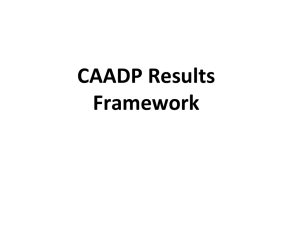
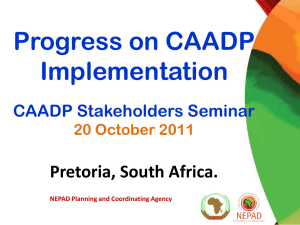
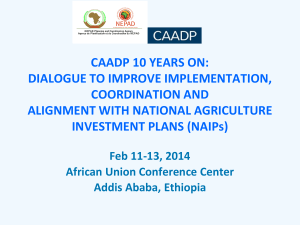
![[Presentation] Making CAADP Work for Women Farmers](http://s2.studylib.net/store/data/005497772_1-93a9c4c75fae2aadb5ac3ab00b3f6f52-300x300.png)
